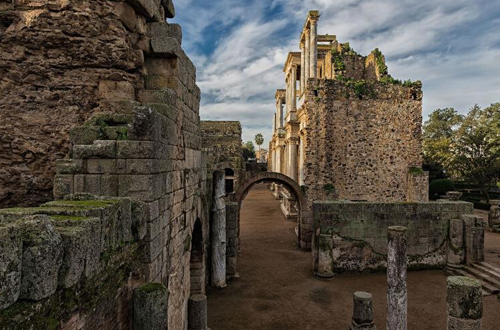In the first century AD,
公元一世紀
the Emperor Claudius would write a 20 volume history of the ancient Etruscans, which is sadly lost.
皇帝克勞迪斯寫了20卷歷史和伊特魯利亞人有關,但是不幸遺失了
Although its loss probably reflects more its quality back in the day,
盡管這部書的遺失反映了當時書的質量
it would've been tremendously interesting,
但是這部書如果保留下來的話
had it survived, not only for our appreciations of the Etruscans,
應該是很有趣的不僅因為我們可以研究伊特魯利亞人
but for our understanding of Claudius,
而且可以幫助我們了解克勞迪斯

who himself proudly traced his ancestry back to the Etruscan clan of the Clausii.
他很驕傲地把自己的血統追溯到伊特魯利亞宗族
Four, the Roman national myth.
第四,羅馬的神話
At the beginning of their history, the Romans
最初,毫無疑問
undoubtedly had to be simple,
羅馬人都是很簡單的
tough peasants with close ties to their native soil
堅韌的農民,和土地聯系緊密
and steeped in the mos maiorum, the way of the elders.
按照祖先留下的方式進行生活
The Romans were always dropping the plow, and picking up the sword and then picking up,
羅馬人總是放下犁,拿起劍
dropping the sword and picking up the plow,
然后放下劍,拾起犁
that sort of thing.
類似這樣的活動
And most of all, they were farmers.
幾乎所有的羅馬人都是農民
To the end of the republican era,
在共和國末期
that is exactly how the Romans saw themselves,
這就是羅馬人對自己的定位
long after they had become a primarily urban culture.
在經歷了初步城鎮文化后,對自己的看法
Of course, by that time, the Romans were also hideously wealthy
當然,那會羅馬人都很富裕
and ruled the western Mediterranean.
統治了西地中海地區
Still, Rome's historians saw it
羅馬的歷史學家依然
as their task to preserve this aura of a simpler time,
認為自己有責任保留簡單時代的氛圍
the simpler time of the mos maiorum,
祖先生活的簡單時代
whenever they wrote about Rome's earliest days.
無論他們怎么描述羅馬早期的生活
Sometimes the tales they tell have little or no historical basis.
有時,他們講述的故事幾乎沒有歷史基礎
Yet, they are very worthwhile for what they tell us about how the Romans saw themselves.
但是,這很值得花時間做,因為這就是羅馬人對自身的看法
After all, it's not as though there's no such thing
畢竟,現在不存在
as an American national myth,
美國的民族神話
however differently you or I might personally interpret it.
供我們作出不同的解釋











